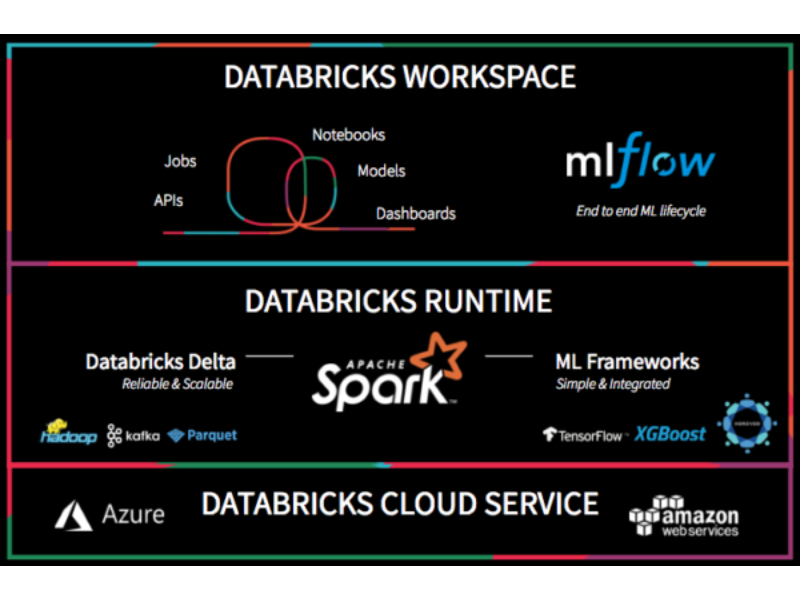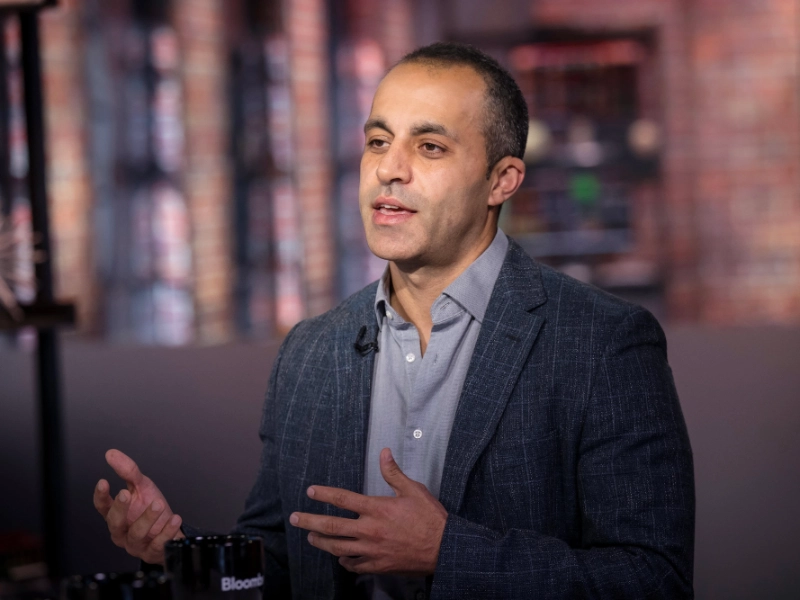- Born during the Iranian revolution, Ghodsi’s family fled to Sweden during the Iran/Iraq war, where he discovered programming on a broken Commodore 64.
- Ghodsi earned a PhD from KTH Royal Institute of Technology, co-founded Peerialism AB, and contributed to Apache Mesos and Spark projects at UC Berkeley.
- Ghodsi prioritised customer-centricity, data-driven decisions, teamwork, and excellence, driving Databricks’ growth and innovation in the data and AI sector.
Ali Ghodsi is a Persian computer scientist and entrepreneur specialising in distributed systems and big data. He is a co-founder and CEO of Databricks and an adjunct professor at UC Berkeley. He co-authored several influential papers, including Apache Mesos and Apache Spark SQL.
Unusual early life
Ali Ghodsi was born around the revolution in Iran in 1978 and his parents were on opposition. By around 1984, during the height of the Iran/Iraq war, the situation inside Iran became increasingly tense. Due to their involvement in the opposition group, they were tracked down. He recalled having approximately 24 hours to leave the country and flee. Family friends came to their house and offered assistance, allowing them to take whatever they needed without payment. With this support, they left the country within the given timeframe. Initially, they sought refuge in any country that would accept them, ultimately finding sanctuary in Sweden. This marked the beginning of their journey.
In the early days in Sweden, they lived a nomadic life, constantly moving from one student dorm to another, often sharing a single room with a shared kitchen among numerous students. They faced eviction multiple times during this period. However, over time, they managed to settle down. Eventually, they acquired a broken Commodore 64, which became his introduction to programming during his second or third grade.
“But eventually, we settled down. And they got me a broken Commodore 64. So, I started programming, I think, in second or third grade. That was the beginning of my journey with computers,” said Ghodsi.
But eventually, we settled down. And they got me a broken Commodore 64. So, I started programming, I think, in second or third grade. That was the beginning of my journey with computers.
Ali Ghodsi, co-founder and CEO of Databricks
Education and career
Ali Ghodsi pursued his academic aspirations with fervour, earning a PhD in Computer Science from KTH Royal Institute of Technology in 2006, advised by Seif Haridi. Ghodsi was a co-founder of Peerialism AB, a Stockholm-based company developing a peer-to-peer data transfer system. He was also an assistant professor at KTH from 2008 to 2009. His research interests spanned distributed systems, cloud computing, big data computing, and networking. Prior to his doctoral studies, Ghodsi obtained an MBA in Logistics and Marketing, as well as an MSc in Computer Engineering, both from Mid-Sweden University in 2002.
He joined UC Berkeley in 2009 as a visiting scholar and worked with Scott Shenker, Ion Stoica, Michael Franklin, and Matei Zaharia on research projects in distributed systems, database systems, and networking. During this period, he helped start the Apache Mesos and Apache Spark projects. He also co-invented the concept of Dominant resource fairness, in a paper that heavily influenced resource management and scheduling design in distributed systems such as Hadoop.
In 2013, he co-founded Databricks, a company that commercialises Spark, and became chief executive in 2016.
Also read: Who is Nick Elprin? CEO of Domino Data Lab wants to get out the way of data scientists
Crafting a culture at Databricks
“We spent a lot of time thinking, what do we not want to be? What do we like from other companies? What are the things that—how do we want to configure this company?” Ali Ghodsi said, “First of all, culture, we saw it as two different things. There’s the culture of how do we get along, like, inside this company. How do we work? Do we have an aggressive culture? Are we collaborative? So, a lot of it is just a code of how do you make thousands of employees gel well together? That’s one aspect of it. Then there’s another aspect of culture which is what are the culture principles that make us competitive in the market so that we can beat the competition? Amazon has frugality as a culture principle. I think it’s their seventh culture principle. That makes sure that they always have the cheapest products that they’re producing. What are those for us?”
We spent a lot of time thinking, what do we not want to be? What do we like from other companies? What are the things that—how do we want to configure this company?
Ali Ghodsi, co-founder and CEO of Databricks
First, Databricks is deeply committed to being customer-centric. Drawing inspiration from Amazon’s customer obsession, employees are encouraged to prioritise the needs and interests of customers above all else. This ethos permeates every aspect of the company, driving innovation and strategic competitiveness.
Second, with its roots in data and AI, Databricks embodies a data-driven culture. Every decision, from product development to business strategies, is informed by data. This commitment to data extends internally as well, with employees utilising Databricks’ own technology for various internal processes, including finance and customer success.
Third, to combat inefficiencies that often arise as companies grow, Databricks emphasises a “company first, team first” principle. This encourages employees to prioritise the overall mission and goals of the company over individual departmental interests. By fostering alignment and collaboration, Databricks aims to avoid the development of silos and internal conflicts.
Fourth, collaboration and teamwork are fundamental to Databricks’ culture. The company advocates for a “teamwork makes the dream work” mindset, recognising the collective effort required to achieve success.
“And the final one that’s really important for me that I spent a lot of my energy on, especially if you’re hyper scaling the way we did, doubling every year the number of employees, is we call it ‘raise the bar, don’t settle.’ So, we’ve sort of really spent a lot of energy figuring out what kind of employees do we want here and how do we test for that. And we have a lot of process around making sure that we’re getting people that are amazing. Because again, if we’re going to cannibalise our own software, and if we think this is the very early innings, this is day zero of data and AI, then actually the software that we have today, the innovation that we have today actually doesn’t matter. In ten years, it’s going to look very different. So then, those employees that we’re bringing in now, that are going to keep innovating and changing this for the next ten years, are actually more important than anything we’ve done in the past,” said Ghodsi.
Also read: Who is Liran Zvibel? CEO of WEKA was an Israeli soldier, now battles data workloads
Introduction to Databricks
Databricks, Inc. is a global data, analytics, and artificial intelligence company founded by the original creators of Apache Spark. The company offers a cloud-based platform to assist enterprises in building, scaling, and governing data and AI, including generative AI and other machine learning models. Databricks is renowned for pioneering the concept of the “data lakehouse,” a platform that combines the capabilities of a data warehouse with a data lake, enabling organisations to manage and utilise both structured and unstructured data for traditional business analytics and AI workloads.

At the core of Databricks’ offerings is the Unified Analytics Platform, providing a collaborative environment for data engineers, data scientists, and business analysts to work across data engineering, data science, and machine learning tasks. Leveraging Apache Spark, the platform facilitates data processing, exploratory data analysis, machine learning model development, and deployment within a single integrated environment.
In addition to the Unified Analytics Platform, Databricks offers specialised products such as Delta Lake and Delta Engine. Delta Lake enhances the reliability and scalability of data lakes for machine learning and data science applications, while Delta Engine accelerates query processing and improves performance for analysing massive datasets.
Databricks SQL is another key offering, providing powerful analytics and business intelligence capabilities for running SQL queries directly on data lakehouse. With support for standard SQL and integration with popular BI tools, Databricks SQL simplifies data analysis and reporting, enabling organizations to derive actionable insights at scale.
In 2023, Databricks acquired MosaicML for $1.4 billion, integrating its Generative AI technology into the Databricks Data Intelligence Platform. The company continues to innovate, introducing DBRX in 2024, an open-source foundation model built on the MegaBlocks project to meet the growing demand for AI technologies.
Founded by Ali Ghodsi, Andy Konwinski, Arsalan Tavakoli-Shiraji, Ion Stoica, Matei Zaharia, Patrick Wendell, and Reynold Xin, Databricks traces its origins back to the AMPLab project at the University of California, Berkeley. The company has expanded its offerings through strategic acquisitions and partnerships, raising $1.6 billion in funding in 2021.
Headquartered in San Francisco, Databricks operates globally with offices across North America, Europe, Asia, and South America, serving a diverse range of clients in various industries.

